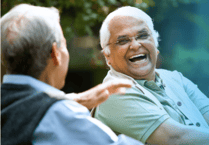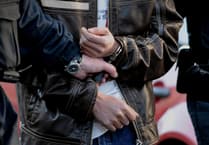STROKE sufferers like 73-year-old Henry Godfrey may soon be gathering in Cinderford to share tips on how to live with a profoundly life-changing condition.
The Stroke Association, funded locally by NHS Gloucestershire and the county council, hopes to set up a Cinderford Stroke Club following the success of the fortnightly Lydney club, which has been established for 20 years.
"I have been in contact with at least five people from the Cinderford area, so there is a need for one, for those who can't get to Lydney," said Gloucestershire stroke peer support group co-ordinator Caroline Seguro.
Henry Godfrey, 73, lives in Cinderford and has been a regular at Lydney Stroke Club with his wife and carer Helen, for about seven years.
Tomorrow is World Stroke Day and Mr Godfrey became one of 150,000 people who annually fall victim to a stroke.
On the night of December 12, 2001, the former British Telecom engineer had driven home – at the time he lived alone – from visiting friends at 11pm and after closing his front door and sitting at a table, slumped to the floor.
"I couldn't understand why I couldn't stand up and couldn't use the phone to dial 999," he recalled. "I finally managed to crawl to the phone. I used the speed-dial and rang my sister but I couldn't get any words out, although what I wanted to say was in my head.
"My sister just said 'go to bed', thinking I was drunk."
He also rang his future wife, Helen but she was out and only received a garbled message he managed to send in the early hours of the morning.
He blacked out for some hours and on awakening the next afternoon managed to crawl to his kitchen and drink some milk.
After a huge effort, he managed to unlock and open his front door and flag down a passing neighbour. Ambulance workers had a struggle getting him out of his house, as his paralysed right leg was blocking the doorway. A brain scan revealed he had suffered a stroke.
His long road to recovery began with a stay in hospital, physio and speech therapy, and continues.
Despite losing the ability to read and write more than a few words at a time, he spent five years writing a short book on his computer, titled My Life With A Stroke.
He and Helen married a couple of years after his stroke, and she retired from her office job a couple of years early to become his full-time carer.
At Lydney Stroke Club, members fundraise to take trips out in a specially adapted minibus and enjoy each other's company in an environment where no one judges each other for their shortcomings.
l To find out more about stroke clubs, call Caroline Seguro on 01452 520723 or the Stroke Association's regional office on 01392 447364.
About six couples regularly attend the Lydney club – typically one person a stroke victim, the other his or her carer – plus it's a lifeline for some elderly people who don't have partners to care for them.
Mr Godfrey has also joined Connect, a befriending scheme for other stroke sufferers, also funded by NHS Gloucestershire and the county council.
Mr Godfrey said the most important advice he could give stroke victims is "don't give up".
Mrs Godfrey, speaking for fellow carers, said it is important to be patient. "I'd also say to other carers, make sure you get some 'me time', even if it's only for 10 minutes or so while you nip out to the shops."
To find out more about stroke clubs, call Caroline Seguro on 01452 520723 or the Stroke Association's regional office on 01392 447364.



